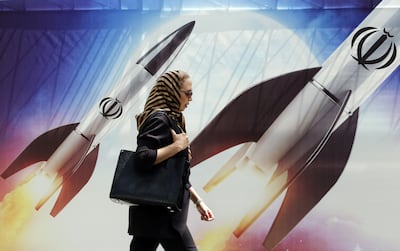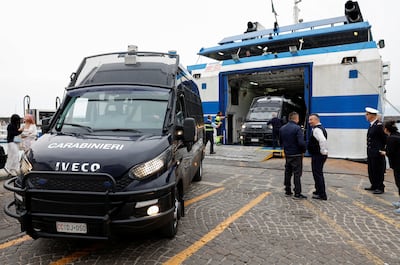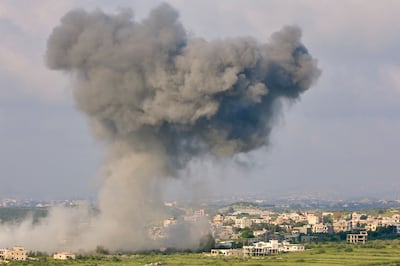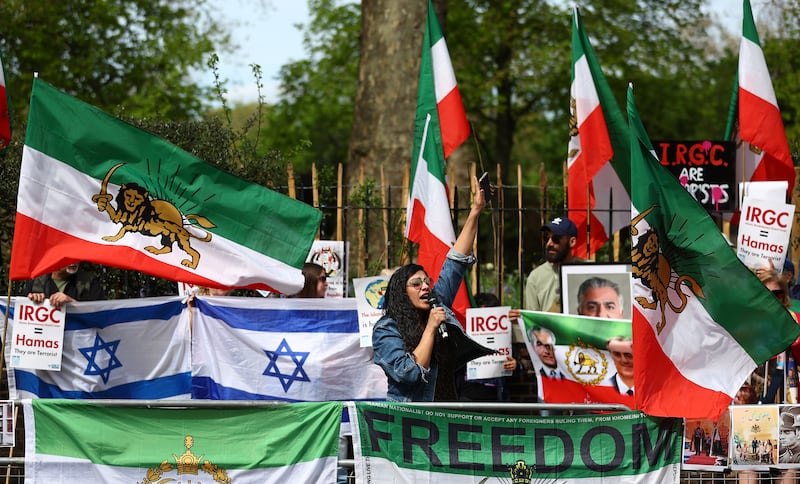Live updates: Follow the latest on Israel-Gaza
The West will plot its response to Iran’s attack on Israel at G7 talks on a scenic Italian island opening on Wednesday, balancing a desire for calm heads against tough-on-Tehran voices in domestic politics.
New sanctions on Iran’s drone assembly line or a crackdown on its Revolutionary Guard networks in Europe are among the options for foreign ministers from the US, Britain, Germany, France, Italy, Canada and Japan.
The Middle East crisis is expected to dominate their three-day talks on Capri in the Gulf of Naples, taking place as Israel weighs up its own response to the drone and missile fire from Iran.
Iran said it gave advance warning of what it called a retaliation for an attack on its Damascus consulate on April 1, saying this showed it did not want a full-scale war.
Desperate to avoid tit-for-tat violence getting out of control, leaders from the G7 are telling Israel to be content with having thwarted most of Iran’s barrage with the help of allied air force pilots.
How much Israel will listen remains to be seen, with UK Prime Minister Rishi Sunak kept waiting for more than 24 hours to even speak to Israeli counterpart Benjamin Netanyahu.
And whether the West will follow its own advice and “take the win” in its own response may depend on how far it is willing to aggravate Tehran at a time when official and back-channel contacts are in use.

Messages containing “warnings and red lines” appear to have been exchanged before the attack on Israel, Iran expert Hamidreza Azizi of the German Institute for International and Security Affairs told The National.
“It was likely that these messages made the entire region and Israel's allies fully prepared for the Iranian attack,” he said.
“However, at present, there do not appear to be ongoing negotiations based on diplomatic give-and-take between the two sides.”
Sanctions options
New sanctions are being considered – with Italy, this year’s G7 president, saying new measures could target those “clearly engaged against Israel”.
French President Emmanuel Macron called for a focus on sanctions as well as isolating Iran and “convincing countries in the region that Iran is a danger”.
Diplomats are looking for a new avenue to pursue, including a crackdown on western components in Iranian drones.
France and Germany are proposing to widen EU anti-drone sanctions on Russia to cover the Middle East and Iran’s rocket arsenal.
"This regime could be also applied to the deliveries from Iran to proxies in the Middle East," the EU's top diplomat Josep Borrell said after a virtual meeting with the bloc's foreign ministers on the conflict.
It could cover "people who are using these kinds of arms from the Lebanon border, in Yemen, in Iraq, in Syria, or wherever", Mr Borrell said.
"We have to move away from the edge of the abyss," he told reporters.
Like many western officials, Mr Borrell is managing expectations by pointing out that Iran is already under heavy sanctions over its missile activity and human rights record.
"Some member states asked also for something that has already been done: a sanctions regime against the ones who provide Iran with the components used for the production of [drones]. This already exists," he said.
“Hardly any country is more strongly sanctioned than Iran,” German Foreign Minister Annalena Baerbock said at a meeting with her Jordanian counterpart Ayman Safadi on Tuesday.
Weapons analysts have linked companies in the US to parts in Iranian-made Shahed drones used by Russia against Ukraine.
Iran appears to “employ a technology that, by using components that could essentially have non-military applications, overcomes military sanctions and incorporates them into its drone industry”, Dr Azizi said.
However, he said any new sanctions “will be a very complex process and the final success rate is unclear”.

Europe could also widen sanctions on people involved in drone production but experience with nuclear and military sanctions suggests they would be “unlikely to have a fundamental impact on Iran’s drone programme”, he said.
The US counters that sanctions make Tehran “produce less effective weapons” but there are calls in Congress to widen them to cover economic contacts between Tehran and third countries, such as China.
Some Republicans also want US President Joe Biden to scrap sanctions waivers that allow food, water and medicine to be imported into Iran, warning they could fund the regime.
State Department spokesman Matthew Miller said the US “continues to look at ways that we can tighten our sanctions, increase the enforcement of our sanctions and, if necessary, impose new sanctions on Iran”.
Iran’s presence in Europe
With Britain saying it wants to “seize this opportunity to increase the international pressure on Iran”, it is open season for long-held grievances about Tehran’s activities in Europe.
Israel has made clear in letters to the G7 ministers that listing the Islamic Revolutionary Guard Corps as terrorists is a key demand of its “diplomatic offensive” against Iran.
The US did so in 2019 but officials in the UK and EU have evaded calls to follow suit, at various times calling it unnecessary, legally shaky or a risk to European hostages in Iran.
Mr Borrell said EU sanctions against the IRGC are impossible without a European court decision showcasing its involvement in terrorist activity.
Answering repeated calls for an IRGC terror listing on Monday, Mr Sunak said security chiefs “have the powers that they need” to disrupt Iran-backed threats.
In Germany, the centre-right opposition is demanding an IRGC ban as part of what it says should be a “wholesale change of course” in Berlin’s policy towards Tehran.

Juergen Hardt, an opposition foreign policy spokesman, said a terror listing could discourage young people from being recruited by the IRGC.
“I am convinced that [the young people] would think again about whether that is a good idea, if they know their chances of one day working or studying in Europe will drastically sink,” he said.
A second focus for German hardliners is an Islamic centre in Hamburg described by intelligence officials as “Iran’s most important representation” apart from its embassy in Berlin.
Amid renewed calls to shut what is seen as an Iranian recruitment and propaganda arm, officials say they are still examining materials seized during a raid in November.
The fact it remains open is “a symbol of the government’s naïve and half-hearted Iran policy”, said conservative MP Christoph de Vries.
Military perspective
While phone lines ring and ambassadors are summoned, the G7 ultimately will have to wait and see how Israel’s war cabinet chooses to respond.
One theory is that instead of striking back at Iran, Israel could open a new front in Lebanon against Tehran-backed Hezbollah.
Ms Baerbock, who headed to Israel on the eve of the G7 talks, made clear this would not be acceptable to Germany as she called for de-escalation “for the whole region”.
“Third states must not be dragged into the spiral of violence, third states will not accept it if they are turned into an ersatz battlefield,” she said.
Dr Azizi said Iran’s response to an attack on Hezbollah might be less intense but it would not “simply stand by and do nothing” in the event of a war in Lebanon.

“From the perspective of Iran's leaders, there is no difference between Hezbollah and Iran in terms of strategic importance,” he said.
“In fact, some analysts in Iran argue that one of the reasons for Iran's decision to retaliate at this time was to deter Israel not only from attacking Iranian targets but also from starting a new war against Hezbollah.”
Despite their pleas for caution and misgivings about Israel’s military campaign in Gaza, western governments have signalled they would intervene again if necessary.
US forces supported by two Navy destroyers took out 80 drones and six ballistic missiles fired from Iran and Yemen during the weekend barrage, the Pentagon said.
The UK said its pilots shot down some drones while covering for US anti ISIS-operations, while German A-400M transport planes helped French Rafale jets refuel.
“We don't want to see a wider regional war,” said US Maj Gen Pat Ryder, but “we will continue to take all necessary action to defend Israel”.






